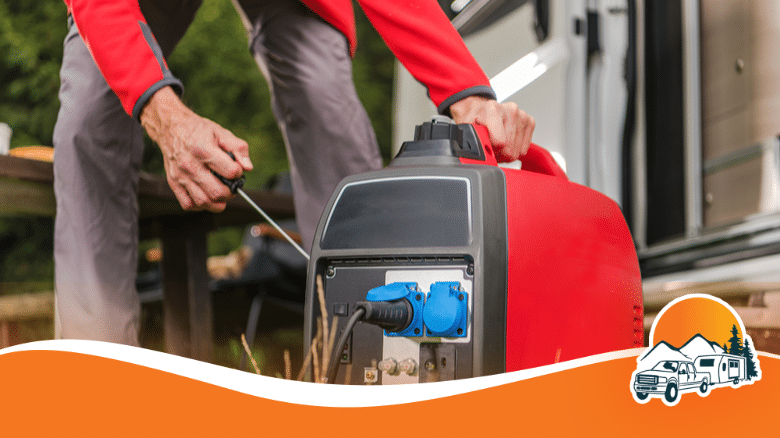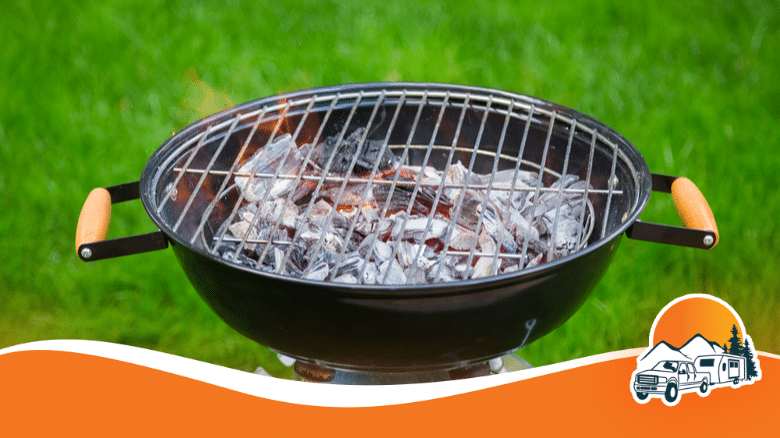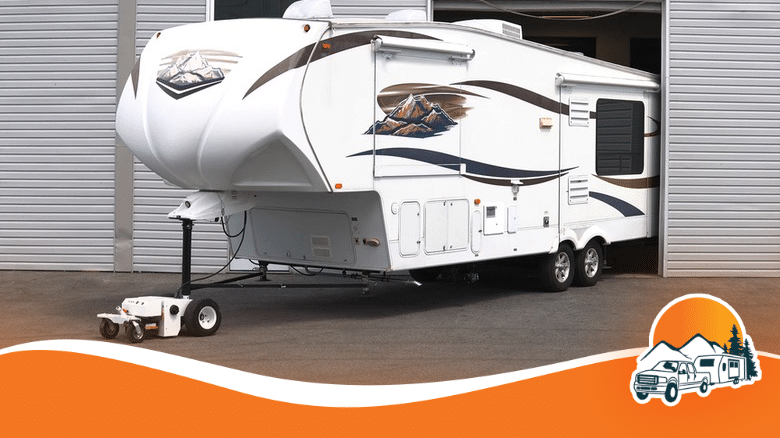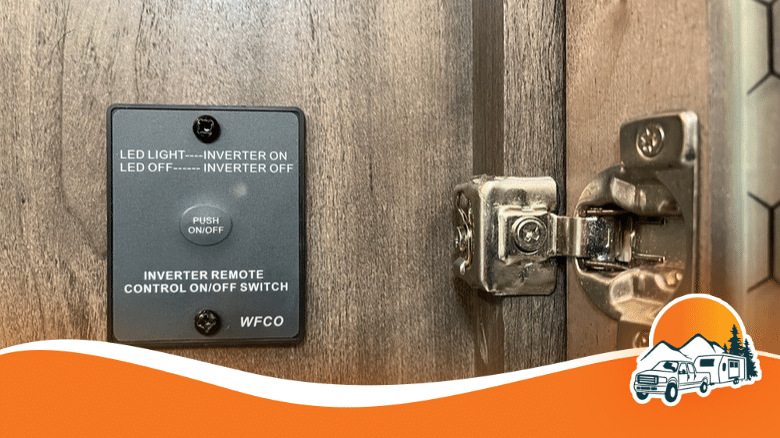Choosing what size generator to run RV AC can be a daunting task.
Indeed, when it’s time to hit the road and enjoy some off-grid adventures, their #1 concern is…
Finding the right size generator for their RV air conditioner.

Many have no clue how to go about this. But understanding what size generator you need to run your RV AC, separates the casual camper from the seasoned RVer.
However, if you don’t know how to select an appropriate power source efficiently, you’ll never fully embrace this level of freedom on wheels.
- Understanding How Generators Work With AC Units
- Determining What Generator Size You Need
- Common Sizes Of Generators That Work Best For RVs
- Maximizing Your Generator Efficiency While Using AC
- Alternatives To Traditional Generators For Powering Your Air Conditioner
- FAQs in Relation to What Size Generator to Run RV Ac
- Conclusion
Understanding How Generators Work With AC Units
The role of generators powering RV air conditioners is often overlooked, yet it’s crucial for comfortable RV life. To understand this relationship better, let’s delve into the concept of a generator functioning as an ‘energy bank’.
The Concept Of Generators As ‘Energy Banks’
A generator essentially functions like a power reservoir, storing energy that can be harnessed to operate various appliances within your travel trailer, including the all-important air conditioning unit.
In terms of AC efficiency and usage, the performance varies across different types of generators. For example, inverter generators are celebrated for their superior fuel efficiency, while portable generators offer unparalleled flexibility with positioning around larger RVs.
Moreover, if you’re looking to power up 30 amp systems efficiently, it’s crucial to consider this when choosing your generator.
Whether you’re comparing smaller units to larger ones or different types of generators altogether, knowing how many starting watts each appliance needs is essential.
This will ensure you select a generator that meets all your requirements without exceeding its capacity.
Start-Up Vs Running Energy Requirements
Your RV air conditioner has two distinct energy requirements: start-up and running wattage required.
The initial burst needed by most electrical devices (including your RV’s rear air conditioning unit) upon startup typically exceeds their normal operating consumption – this is referred to as starting power or peak load requirement.
Afterward comes the continuous draw, which we call running wattage – steady-state power output once an appliance has started up fully.
The difference between these two values can significantly influence what size generator you need. If not properly accounted for during regular rv maintenance routine, there could be potential risks associated with underpowering or overpowering certain equipment leading to unnecessary wear & tear.
In our next section, “Determining What Generator Size You Need”, we’ll discuss more on how you can calculate exactly what kind & size would work best considering both these aspects along with other factors too.
Key Takeaway: Generators play a critical role in powering RV air conditioners, acting as an ‘energy bank’ that stores power for various appliances. The selection of the right generator size or type depends on understanding the starting watts each appliance requires, with two distinct energy requirements to consider: start-up and running wattage.
Determining What Generator Size You Need
When selecting the ideal generator for your RV lifestyle, one of the most crucial choices you’ll make is deciding on a suitable size.
The power output required by your air conditioning unit and other appliances in your travel trailer plays a significant role in this decision.
Factors Influencing Generator Size Choice
Your RV’s rear air conditioning unit, along with other electrical devices, will determine what generator sizes are suitable for you.
Larger RVs often require more powerful generators due to their increased energy demands. However, smaller units may be able to operate efficiently on smaller generators.
In addition to considering wattage requirements for starting watts (starting power) and running watts of each appliance, it’s also important factor fuel tank capacity into consideration. This can influence how long a generator can run before needing refueling.
Formulas For Calculating Wattage Needs
- To calculate total starting watt needs: Add up all the ‘Starting Watts’ listed for each device that could potentially start at the same time.
- To estimate running watt requirement: Total up ‘Running Watts’ mentioned on every equipment or gadget likely operating simultaneously within an hour.
These formulas provide useful guidelines when determining whether portable generators or inverter generators would best suit your needs.
Remember that incorporating these considerations into a regular RV maintenance routine helps ensure smooth functioning while traveling.
In essence, understanding AC efficiency making & sizing adequately contributes significantly towards enjoying uninterrupted comfort during travels.
Key Takeaway: Choosing the right size generator for your RV is crucial and depends on the power output required by your air conditioning unit and other appliances. Factors such as wattage requirements, fuel tank capacity, and energy demands of larger or smaller RVs all influence this decision, with formulas available to calculate total starting watt needs and running watt requirements to ensure smooth functioning while traveling.
Common Sizes Of Generators That Work Best For RVs
In the world of RV generators, size does matter.
The generator sizes you choose can significantly impact your RV life, especially when it comes to powering your air conditioning unit.
Low-end (400 – 800 watts) Generators
If you own a smaller unit or travel trailer that only requires a minimal power output, low-end generators might be suitable for you.
These smaller generators are portable and easy to carry around but may not have enough starting watts to run larger appliances like an AC efficiently, making them ideal for less demanding needs.
Mid-range (2200 Watts) Generators
A mid-range generator is often sufficient for most regular RV maintenance routines and running an average-sized RV’s rear air conditioning unit without any issues.
This type of inverter generator provides a good balance between portability and power capacity with a decent fuel tank size.
High-End (3400 – 4000 Watts) Generators
Larger RVs usually require more powerful units due to their increased energy demands, including multiple air conditioners.
High-end models provide ample wattage required even during peak usage times, ensuring comfort all throughout.
In choosing among these different types of generator types, consider both the starting power needed by your devices as well as their ongoing operational requirements.
This will ensure seamless operation while also maximizing ac efficiency making each trip enjoyable regardless of how remote the destination may be.
To wrap up this section on common sizes of generators best suited for RVs, remember that understanding what fits right into one’s specific need goes a long way toward the efficient use of resources.
As we transition next part of our discussion, let us delve deeper into ways to optimize the utilization of our resources, particularly when using an active air conditioning unit within an RV.
Key Takeaway: In the realm of RV generators, size significantly impacts your RV experience, especially when powering an air conditioner. From low-end generators suitable for smaller units to high-end models designed for larger RVs with increased energy demands, understanding what fits your specific needs ensures efficient resource use and maximizes AC efficiency during each trip.
Maximizing Your Generator Efficiency While Using AC
The efficiency of your generator directly impacts the overall performance and longevity of your RV’s air conditioning unit.
Maintaining a regular RV maintenance routine is essential to ensure that both systems work harmoniously together, providing you with comfort during those hot summer days on the road.
Balancing Multiple Appliance Loads Effectively
To maximize generator + AC efficiency making, it’s crucial to balance multiple appliance loads effectively.
Your RV air conditioner, for instance, requires more starting watts than running power.
This means that when you first turn on your air conditioning units or if they have been off for some time, they will draw significantly more power from your generator before settling into their normal operating wattage required.
Adjusting Usage Times Strategically
In addition to load balancing among appliances like travel trailers’ refrigerators or smaller units such as laptops and phones alongside larger RV’s rear air conditioning unit usage, adjusting usage times can also contribute towards optimizing energy consumption in an RV life setting.
You might consider using high-energy-consuming devices at different intervals rather than all at once so as not to exceed the maximum output capacity of portable generators, which could lead to them shutting down due to overloading.
Inverter generators, known for being quiet and fuel-efficient compared to other types, are ideal for this strategy since they adjust their engine speed to match demand, thus saving gas and extending the lifespan of the equipment.
Taking Advantage Of Off-Peak Hours And Weather Conditions
If possible, use heavier appliances during cooler parts of the day/night when the AC won’t need to run full blast, thereby reducing the strain size generator needed simultaneously to power several items.
Avoid turning everything on at the same moment, or start-up surge may overload even the best RV generators causing potential damage and long-term issues in its functionality reliability.
Key Takeaway: Maximizing the efficiency of your generator while using AC in your RV involves maintaining a regular maintenance routine, balancing multiple appliance loads effectively, and adjusting usage times strategically. Taking advantage of off-peak hours and cooler weather conditions can also help reduce strain on the generator, preventing potential damage from overloading.
Alternatives To Traditional Generators For Powering Your Air Conditioner
However, as technology advances and environmental consciousness grows, alternatives are emerging that could potentially reduce our dependence on these conventional power sources.
Solar Powered System Benefits
The most notable alternative is solar panels. Solar-powered systems offer numerous benefits over traditional generator types, such as inverter generators or portable generators.
Firstly, solar energy is renewable and sustainable, unlike fossil fuels used by many standard RV generators.
This makes it an eco-friendly choice for those conscious about their carbon footprint while enjoying travel trailers adventures.
Aside from being beneficial for the environment, solar power can also be cost-effective in the long run, with potential savings on fuel expenses.
While initial setup costs might seem high compared to smaller units like 400-watt options of regular RV maintenance routine equipment, savings accrued through reduced fuel expenses can offset this expenditure over time.
- Sunlight-dependent: Although they provide clean energy with minimal noise pollution (compared to larger RVs), solar panel efficiency depends heavily on sunlight availability which may not always be reliable, especially during cloudy days or at night.
- Limited starting watts: The peak wattage required by some appliances when they start up – known as ‘starting power’ – might exceed what your solar system can deliver at once. Hence you’ll need to plan usage times strategically so all devices aren’t switched on simultaneously.
- Battery storage needed: Since sunlight isn’t available round-the-clock, a battery bank will be necessary for storing excess electricity generated during daylight hours. This adds another component to your setup but ensures uninterrupted supply even after sundown.
Despite these limitations, savvy travelers find ways around them. For instance, balancing multiple appliance loads effectively helps manage limited starting watts. Similarly, integrating a small backup generator provides additional support if weather conditions affect solar output.
In conclusion, the size generator required ultimately depends upon individual needs.
However, it’s evident that exploring alternatives beyond traditional rv air conditioners’ solutions has its own set of advantages.
Even integrating just one pair of 100W panels could make a significant difference toward ac efficiency making. So why not give it a shot?
Key Takeaway: As technology progresses and environmental awareness grows, alternatives to traditional generators like solar-powered systems are emerging as potential solutions for powering RV air conditioners. Despite certain limitations such as dependence on sunlight availability and limited starting watts, solar panels offer numerous benefits including sustainability, cost-effectiveness in the long run, and reduced noise pollution compared to conventional generators.
FAQs in Relation to What Size Generator to Run RV Ac
What size generator do I need to run an RV air conditioner?
A 3000-4000 watt generator is typically sufficient for running most RV air conditioners, but it’s best to check your specific AC unit’s power requirements.
How big of a generator to run a 13500 btu RV air conditioner?
To operate a 13,500 BTU RV air conditioner, you’ll likely need a generator that can produce at least 3000 watts.
How big of a generator do I need to run a 15000 BTU RV AC?
A larger capacity AC like the 15,000 BTU requires around 3500-4000 watts. Hence, consider getting a more powerful generator in this range.
What size generator do I need for a 50 amp RV air conditioner?
If you’re operating an AC on a larger scale (50 amps), opt for generators with minimum capacities of about 6000 watts or higher.
Conclusion
Understanding what size generator to run RV AC is a game-changer for any camper.
You’ve learned that generators are like energy banks, providing the power needed for your air conditioner and other appliances in your RV.
We’ve explored how to calculate the wattage requirements of your RV’s AC unit and considered factors such as start-up versus running energy needs.
There are various sizes of generators available, from low-end 400-watt options up to powerful 4000-watt models – there’s something suitable for every need!
To maximize efficiency, it’s crucial to balance appliance loads effectively and adjust usage times strategically.
Solar-powered systems were also introduced as an alternative way of powering your air conditioner – potentially reducing dependence on traditional fuel-based generators.
At Ever RV we have more guides just like this one. Discover tips, advice, product reviews, and so much more aimed at enhancing your camping experience!







